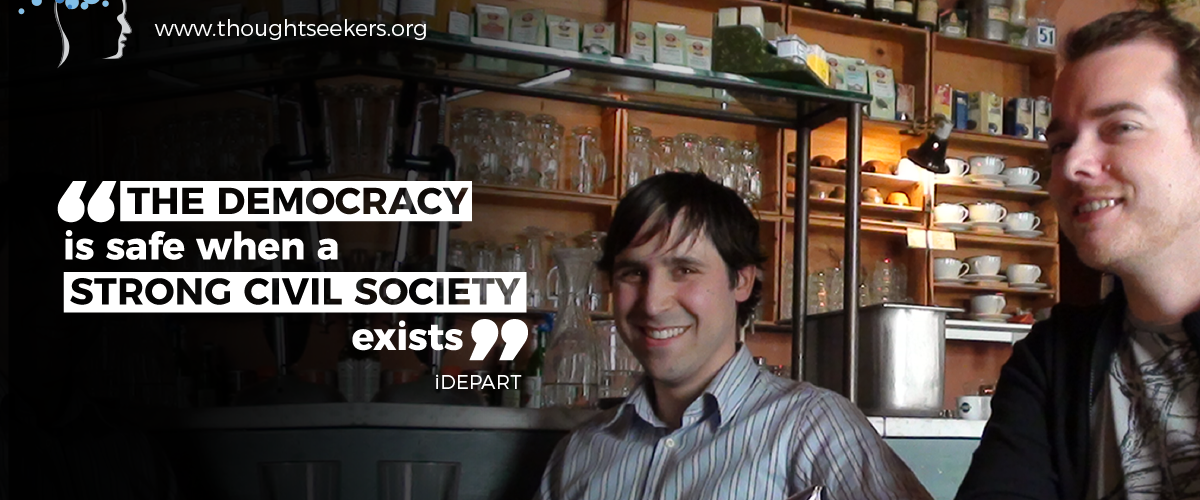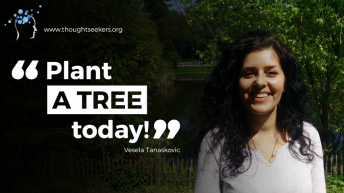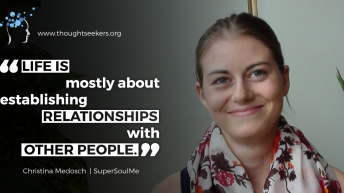the iDEPART team – thoughtSeekers
What was your motivation to start iDEPART?
Bernhard: I’m in the IT industry. I worked for a long time at an IT company and I wanted to do something that was more for me. I felt I could do something both realistic and meaningful. And that got along pretty well with Philipp.
Philipp: I have worked as an analyst for 6 years in the financial industry. In 2011 I decided to change and do something on my own, and that’s how we got together. We’ve had the idea for some time to make such a platform as iDEPART, it has been around in our heads for quite some time. We have always wondered: “Why isn’t there something like that?”; and then we thought: “If there is no such thing, we have to do it!”
Is iDEPART your only focus?
Philipp: iDEPART is currently what I mainly do. Although I’m self-employed, the focus is on developing the platform. It takes a lot of time, because it’s not just about technical development, it’s also about bringing initiatives to the site, promoting the platform in PR, finding potential sponsors, so that the platform does not just depend on donations, but can be sustainable.
Philipp: Since we have started, I wanted to build an useful tool that can empower citizens to influence policy decisions. Before that, I thought it was weird that the citizen is not really represented in the state, the only one who does not have a really strong lobby. He is allowed to vote, but what truly happens is often top-down. It is given and the citizen has to accept it. While there are some democratic opportunities to preside, they are very, very little noticed. And there are lobbies in companies that have a very strong influence on politics, or other interest groups that have a very strong influence on politics, and the citizen itself is actually left out.
What is iDEPART actually?
Bernhard: iDEPART is a defense platform for democratic participation, and consists of two parts. One is an innovation part, so that people can inform themselves about political views, which initiatives are currently running and there’s also a knowledge database with tutorials, how-to-s, best practices to take action. And the second half of iDEPART is the activity page. This should actually create pressure groups, users can become more conscientious, get involved and demand change and do something for it.
Philipp: It’s not just about criticizing everything as a citizen, but also saying, “We have a better proposal.” There are many good ideas out there. In some cases, citizens come from very specialized areas and they should also be perceived much more strongly by the political representatives as an active dialogue partner.
What challenges did you encounter?
Bernhard: One of the challenges was definitely the idea of communicating on a first basis. Of course, from the beginning there were people who supported us, either supporting members or others. In order to be able to operate such a platform in our size sustainably, it needs appropriate support.
Philipp: Not only financially, but also people who are multipliers, who spread the word, who recommend it further.
How do you stay motivated and focused? Do you really think that something can be changed?
Bernhard: In the beginning we got – in addition to some positive feedback – the usual sentence in Austria
“that cannot work that way. It won’t work in Austria. You won’t get enough people involved, it’s not part of our political culture”
Meanwhile, what has actually happened is that the feedback has been enormously positive. At least by winning the Social Media Awards and an investment by Respekt.net. All these things have told us in a way “ok, obviously we are not the only ones who believe that this can work”, and that was very motivating.
Who are your strongest supporters?
Philipp: For me it is the family. The more you get positive feedback, the more motivating it is, but only positive feedback is not good either. You also need people who tell you things where you have to improve.
Why are you doing this?
Philipp: We are a generation likely to face many educational challenges; the trick is managing our leadership to meet this challenge. That’s why we’re doing this, to leave these crusty educational structures behind by offering something else instead, something sustainable.
If you had absolute powers, what would be the first things you would change?
Philipp: Basically, we do not see any problems in Austria. But we see room for improvement. We believe that much is obsolete in politics, has not changed for decades, although quite a lot has developed in times of the Internet. There are some scandals, corruption scandals for the huge primal committee, where one sometimes wonders how it is possible that in a democratic country, people use the system as a self-service shop.
Bernhard: Actually, it’s not what we see on the street that hurts, it’s what we read in the papers, through certain websites, because we just see that people do not feel like they could actually change anything. Really participate. And to re-create this self-understanding that one is part of the system, part of politics that one could and should contribute as a citizen, that should additionally change.
What is the one biggest thing you want to achieve with iDEPART?
Philipp: For me, I sometimes see everything is going great in Austria, we complain at a high level, as there are other, more basic and immediate problems in other countries. But then there are many moments when I think to myself: “We are not actually whining, the only thing we want to do is strengthen our democracy. We believe that a civil society, active citizens are necessary to ensure a vibrant democracy.”
What do you really want to achieve?
Bernhard: I really want change.
Philipp: I want to further develop the concept of democracy in Austria over the next 50 years. Prosperity is a very important factor in keeping democracy alive. However, when prosperity goes down, I think democracy is in danger. This is ensured when there is a civil society that observes political decisions that criticizes and also want to help shape political decision-making.







Add comment